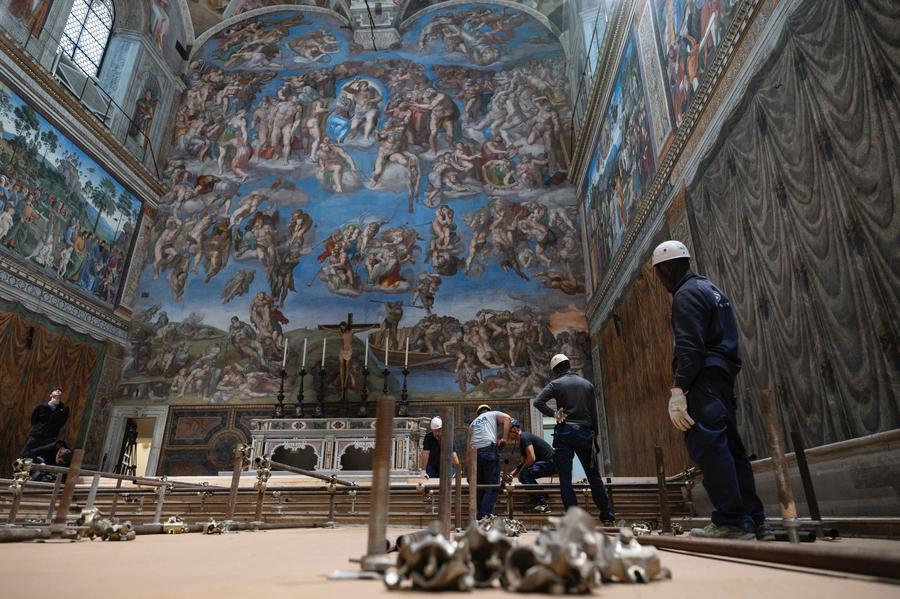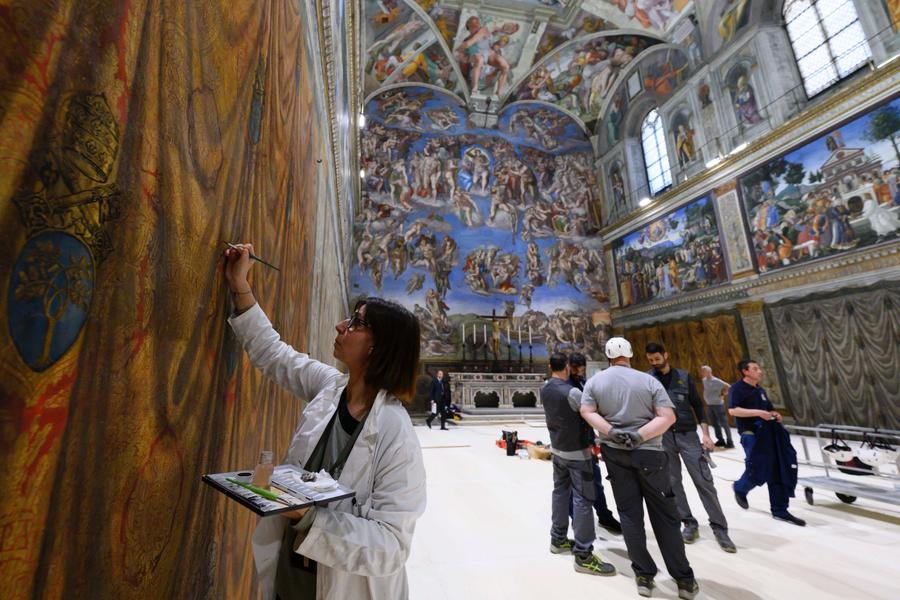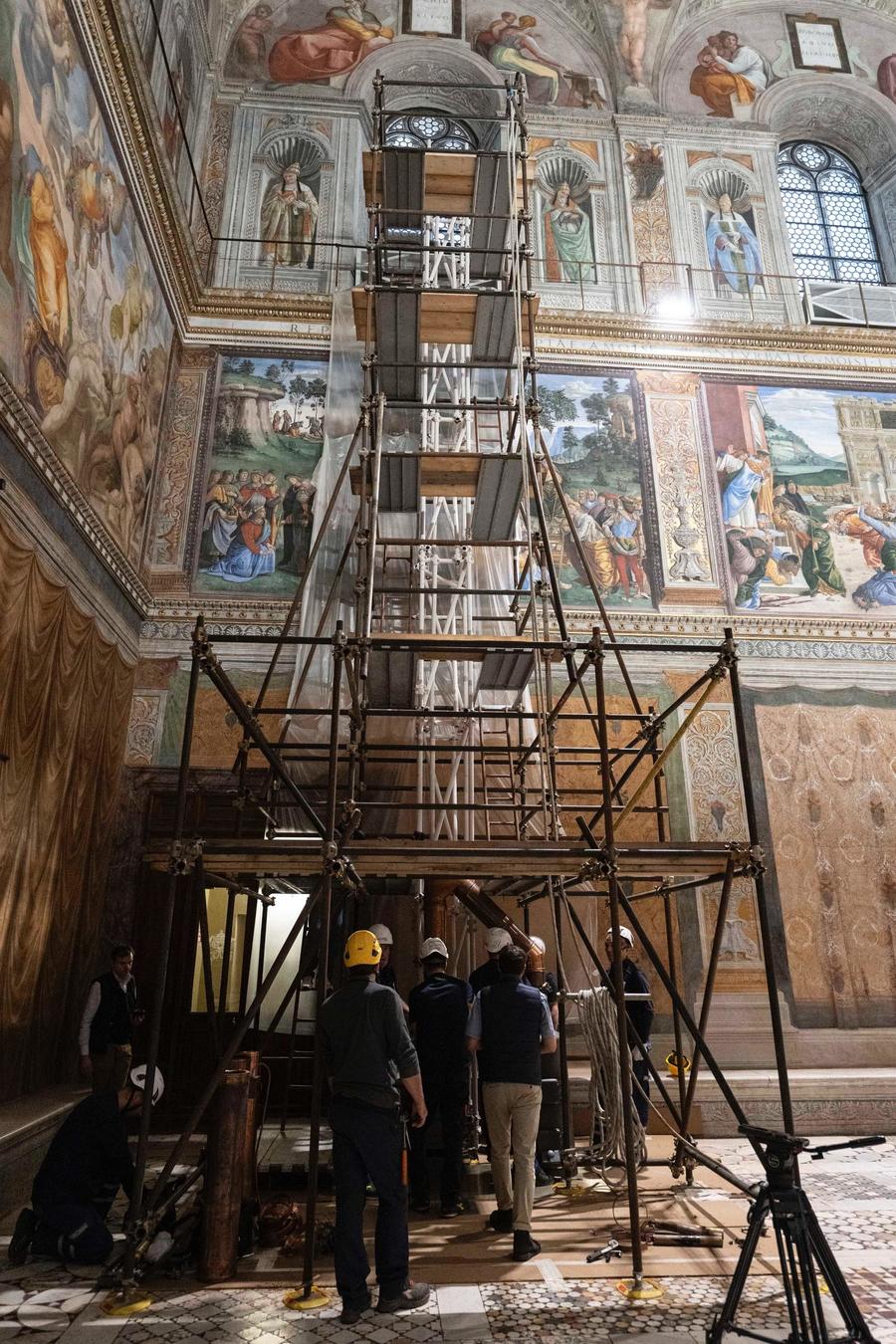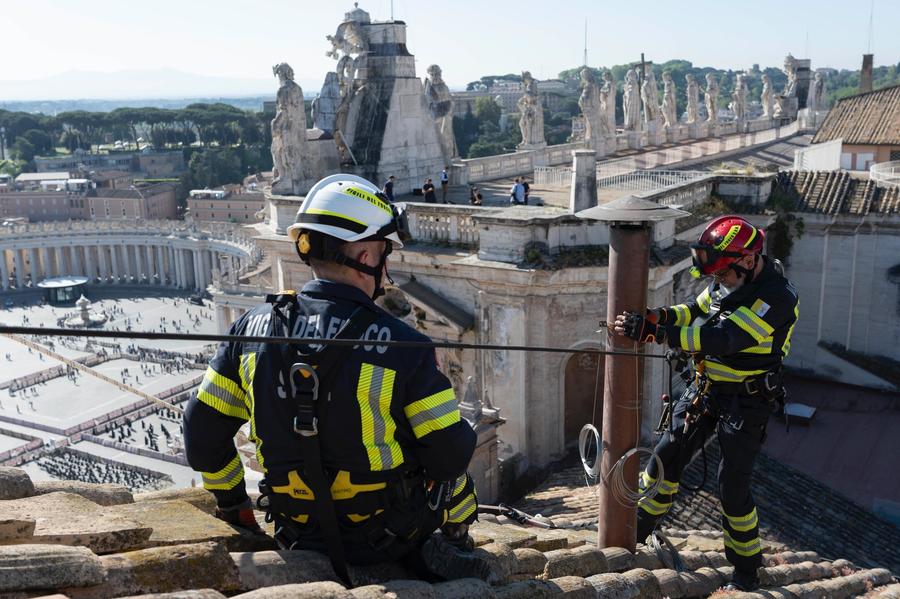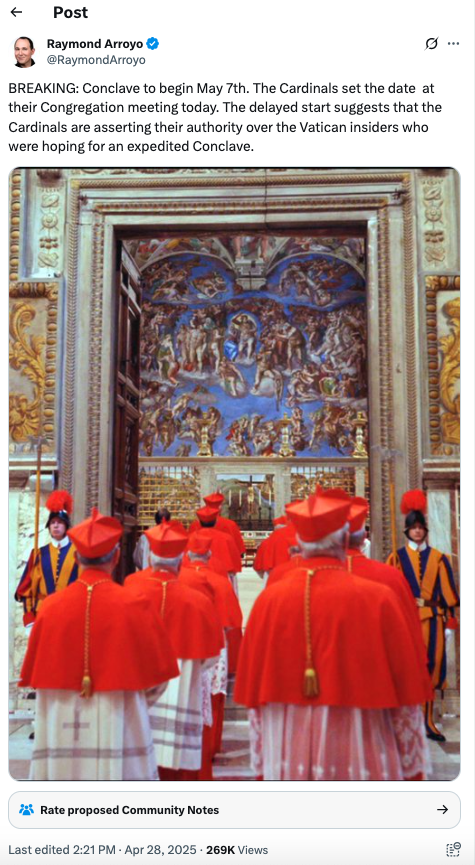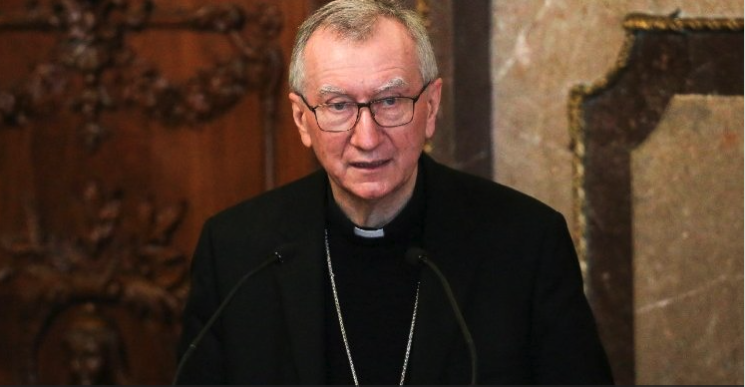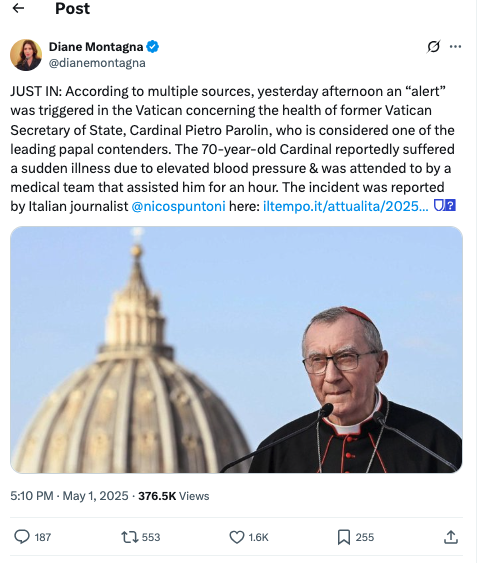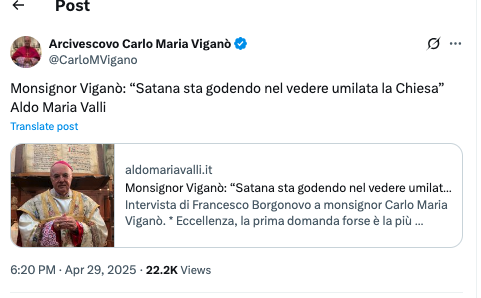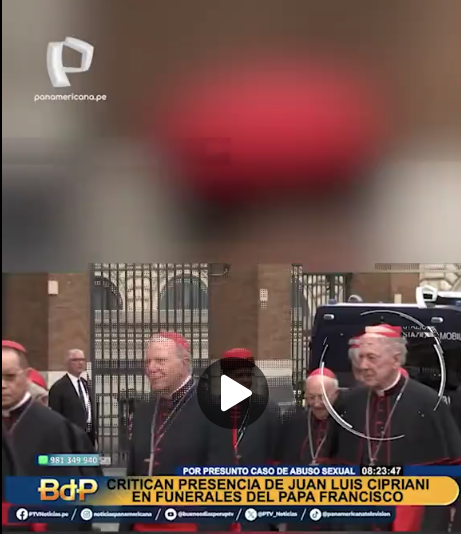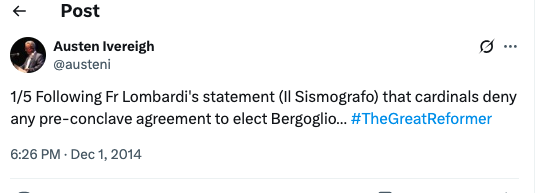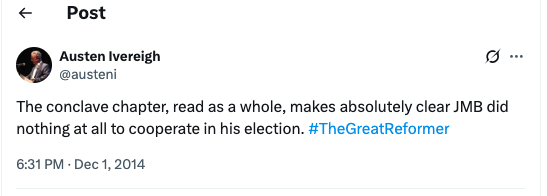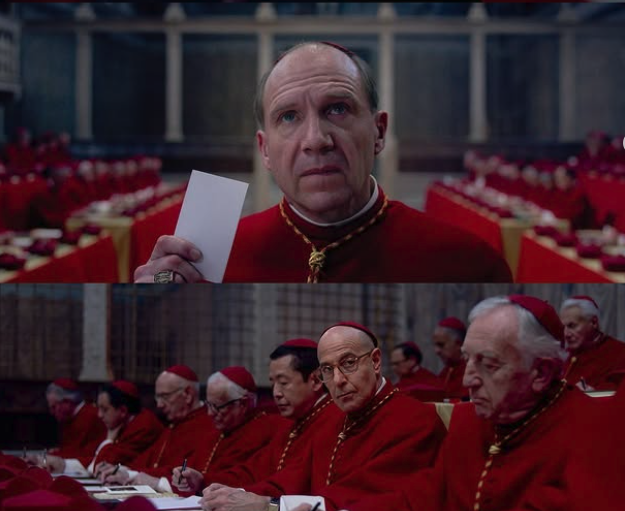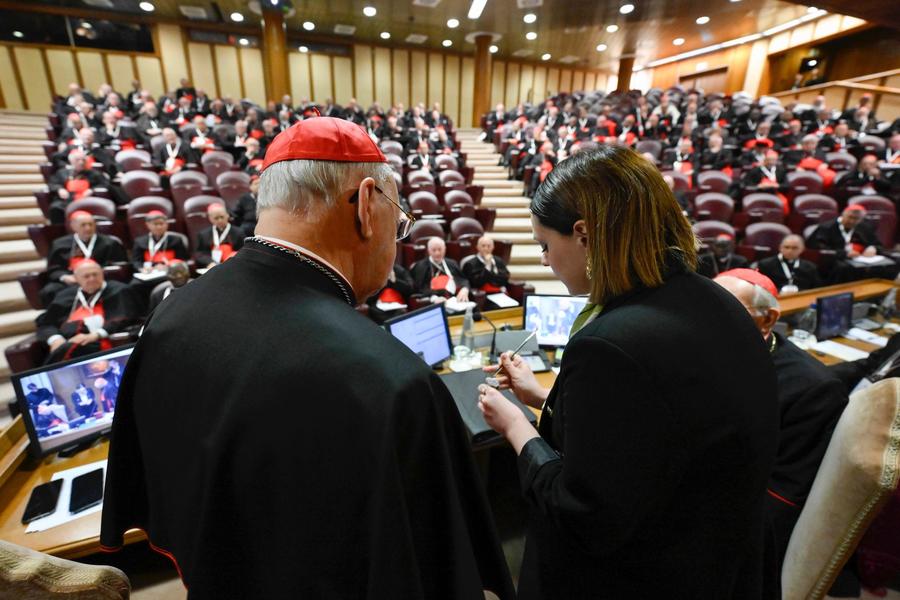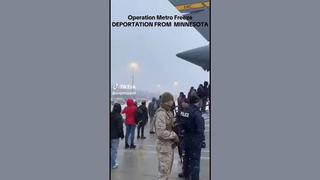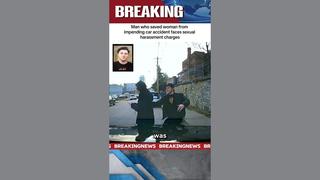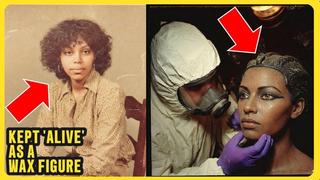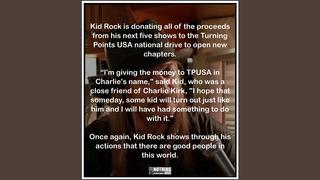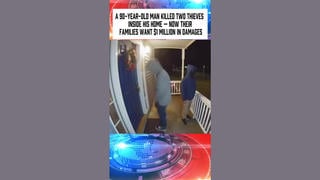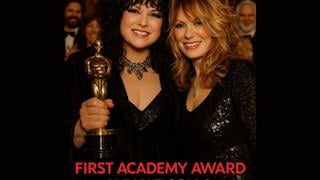STORY UPDATED: check for updates below.
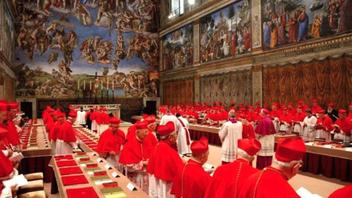
The conclave to elect Pope Francis' successor is set to start on Wednesday, May 7, 2025. It is a centuries-old ceremony entrenched in secrecy and powerful rituals, which strikes the world's imagination. This year, 135 cardinals from 71 countries across the five continents (of which Pope Francis has appointed 108, and 12 come from countries that never had a cardinal before) are convening in Vatican City to pray, meet, get to know each other, and finally cast their ballot. Out of the 135, two have already announced that they cannot attend due to health reasons.
How the vote works
The ritual inside the locked Sistine Chapel has been a long-time subject of fascination. From May 7, everything will be shrouded in mystery after the cardinals enter the room adorned by Michelangelo's frescos of the Last Judgement.
Preparations for the conclave inside the Sistine Chapel (photo courtesy of Vatican Media)
The master of papal liturgical celebrations orders all individuals other than the cardinal electors to leave the chapel and pronounces the phrase "Extra Omnes" (everyone out). The chapel is locked and, according to the official rules, detailed in the Universi Dominici Gregis, "Throughout the election process, the cardinal electors must refrain from sending letters or engaging in conversations, including phone calls, except in cases of extreme urgency. They are not allowed to send or receive messages of any kind, receive newspapers or magazines of any nature, or follow radio or television broadcasts."
The Sistine Chapel is secured and prepared for the conclave. It will be closed to the public from Sunday, May 4th (photos courtesy of Vatican Media)
A two-thirds majority is required. If voting begins on the afternoon of the first day (as is the case this year), "there will be only one ballot. On subsequent days, two ballots are held in the morning and two in the afternoon. After the votes are counted, all ballots are burned. If the ballot is inconclusive, a chimney over the Sistine Chapel emits black smoke. If a Pope is elected, white smoke will billow out of the chimney."
The installation of the chimney above the Sistine Chapel (photo courtesy of Vatican Media)
Why May 7th?
The very date of the conclave sparked some of the first conspiracy theories. The American journalist Raymond Arroyo, on X, wrote: "The delayed start suggests that the Cardinals are asserting their authority over the Vatican insiders who were hoping for an expedited conclave." The idea is that some of the progressive cardinals closer to Francis wanted an earlier start to guarantee a quicker conclave. Not everyone agrees, pointing out that counting the 15 full days is set in the canon law and was fully respected in this case. But it is true that, in a motu proprio letter published on February 22, 2013, Pope Benedict XVI allowed the possibility of moving forward the date of the conclave:
"Nonetheless, the College of Cardinals is granted the faculty to move forward the start of the conclave if it is clear that all the Cardinal electors are present."
However, the date of the conclave was established on April 28th, 2025: that day, as stated in an email received by Lead Stories from the Holy See press office, "just over a hundred" out of 135 cardinal electors were present in the Vatican.
Raymond Arroyo's post on X on Aprile 28, 2025 (Source: X)
Front-runners attract conspiracists
"Who enters the conclave as a pope leaves as a cardinal," goes the popular saying, meaning that the favorite names circulating ahead of the election will not necessarily end up as the frontrunners or the ultimate chosen one. Past predictable elections proved this to be a false cliché, and there are high expectations on a shortlist of cardinals, even attracting odds-makers at betting agencies. It's unsurprising that some of these names are also the object of preventive criticisms, propaganda campaigns, and some old conspiracy theories. The current Secretary of State, Pietro Parolin, who would be the first Italian to return to the Throne of Peter in 47 years, is no exception.
Cardinal Pietro Parolin (photo courtesy of Vatican Media)
Parolin and The Prophecy of Malachy
Playing with Parolin's first name, Pietro, some old apocalyptic conspiracy theories resurfaced, claiming that his papacy - if it happened - would be the last of the Church. It is called the prophecy of Malachy, a 900-year-old collection of obscure Latin mottos according to which the last name in the prophecy of the popes is "Peter the Roman", which has been interpreted as indicating the final pope at the end of the world: "Peter the Roman, who will nourish the sheep in many tribulations; when they are finished, the city of seven hills will be destroyed, and the dreadful judge will judge his people. The end."
Parolin and physical fitness?
Calumnies to eliminate undesirable candidates have always been present, and it was sufficient in the last conclave in 2013 to raise the matter of Jorge Mario Bergoglio's health. Before the election, rumors spread that he had only one lung, and some cardinals asked him about it at the conclave. It was not true: in 1957, when he was 21, he had had the upper lobe of his right lung removed because of three cysts, and the lung recovered by expanding to replace lost capacity, he explained to the author of a 2021 book "La salute dei papi".
Rumors about Parolin's health started spreading in the week ahead of the conclave. On May 1st, the American journalist Diane Montagna wrote on X (archived here):
According to multiple sources, yesterday afternoon an "alert" was triggered in the Vatican concerning the health of former Vatican Secretary of State, Cardinal Pietro Parolin, who is considered one of the leading papal contenders. The 70-year-old Cardinal reportedly suffered a sudden illness due to elevated blood pressure & was attended to by a medical team that assisted him for an hour.
The source mentioned by Montagna is an Italian newspaper, Il Tempo, which briefly mentions the details, without indicating sources, at the end of an article, adding that "Parolin's health is not in danger". Something that Montagna forgot to add to her post, which gained traction in a very short time (over 1,6 million likes by May 3nd) and numerous comments pointing to the need to exclude him from the conclave, and some even connecting his alleged illness to his support in favour of Covid vaccines.
Diane Montagna's X post on May 1st, 2025 (Source: X)
On May 2nd, during a press conference, the Holy See Press Office director, Matteo Bruni, refuted the hypothesis of Cardinal Pietro Parolin falling ill, specifying that "no such incident had occurred." He also denied the involvement of medical or nursing staff.
The American dossiers
In her X profile, Montagna states that she's the executive director of The College of Cardinals Report, a website launched at the end of last year by the British journalist Edward Pentin to profile all the electable cardinals and rate their stance on several issues.
The site is highly critical of cardinals close to Francis, and also includes a not so favorable portrayal of Parolin himself (where past health issues are also mentioned), while it openly advocates for more conservative cardinals like the Hungarian Péter Herdo or the Guinean Robert Sarah.
Several news outlets (for example, here and here) have reported that US conservatives are exerting political pressure to influence and possibly reverse power dynamics in the Vatican. In 2018, several specialized websites reported about a US group called Better Church Governance, seeking more than 1 million dollars to create a detailed dossier about cardinals called "The Red Hat Report."
According to press reports, when presenting the project - aimed at improving governance and accountability within the Church - the organizers said, "we may not have had Pope Francis" had it existed at the time of his election.
One of the first targets was Wikipedia. The founder of the project, Philip Nielsen,said in a speech delivered in Illinois in 2021: "Francis was elected because of a lack of information", adding that his Wikipedia page was giving the wrong impression that he was a conservative. Nielsen then said, "I thought: why don't we get a bunch of academics, volunteer researchers, and improve the Wikipedia pages? It's kind of simple.".
In 2018, the website Crux reported an email exchange in which Nielsen made clear the project's targeting nature.
Crux reported that Nielsen wrote in an email:
For example, Cardinal [Pietro] Parolin, the very corrupt Vatican Secretary of State's wikipedia page is currently very benign, with no links to scandal included, despite the fact that he has repeatedly been linked with banking scandals ...We can change that... by the next conclave, he needs to be known, worldwide, as a disgrace to the Church. Our plan would be to make sure that his Wikipedia page shows Church Watchdog The Better Governance Group, names Parolin, 'Extremely Guilty of Abuse' etc. with a link to the report. At the same time, we would add all the pull-quotes from other sources that connect him to all the financial corruption, etc.
Parolin's current Wikipedia profile page doesn't include any of these statements. Lead Stories contacted Nielsen for an update on the Red Hat Report; we will update this article if we receive a reply.
Election-style declarations of illegitimate electors
Carlo Maria Viganò, a former Apostolic Nuncio (ambassador) to the United States of America, was excommunicated on July 4, 2024, following a Vatican trial that found him guilty of schism (in the Catholic Church, it is considered a schism the refusal to submit to the Pope).
In an interview on April 29, 2025, ahead of the conclave, Viganò reiterated his accusations against the late pope, stating that he "usurped" the papacy and all the cardinals he nominated are illegitimate. "Satan enjoys seeing the Church humiliated by its own Ministers," he also said in a post on X (archived here).
The shocking statements sparked claims about the legitimacy of the conclave, with the kind of electoral rigging claims that are now commonplace in worldly elections, like in this X post:
The clergical who should be top of the list in the conclave. Yet it isn't, because it's a rigged election with fake catholics and the jew war machine behind it.
A sanctioned Cardinal spotted at pre-conclave meetings
In 2019, the Archbishop Emeritus of Lima, Peru, Cardinal Juan Luis Cipriani Thorne, was sanctioned by the Holy See amid allegations of sexual abuse of minors in the early 1980s, as confirmed by the Holy See Press Office director Matteo Bruni, on January 26, 2025. Bruni said that after the acceptance of his resignation as Archbishop of Lima, Cipriani's punishment included specific disciplinary measures related to public activity, place of residence, and the use of insignia. The Cardinal "signed and accepted" the measure, Bruni added.
Despite the restrictions, Cipriani, who always denied the accusations, showed up at the Vatican to pay his respects to Pope Francis and was seen in some of the pre-conclave meetings with fellow cardinals, where issues concerning the future of the Church and the election of the new pope were discussed.
Monsignor Cipriani visiting Pope Francis' lay in state site (source: Panamericana TV TikTok account)
According to multiple press reports (here and here), Cipriani was also seen "leaving the hall where general congregations are taking place, dressed in his cardinal attire despite having been banned from doing so." Crux, a reputable outlet on Vatican matters, reported: "Chilean clerical abuse survivor Juan Carlos Cruz, a member of the Pontifical Commission for the Protection of Minors, called Cipriani's presence at pre-conclave meetings 'profoundly troubling.' 'While canon law prevents him from voting due to his age,' as Cipriani is over 80 and is therefore ineligible to vote in the conclave, 'his mere presence in these critical deliberations is a scandal and a deep offense to survivors and the faithful,' Cruz said."
The pedophilia scandals are, of course, prominent in these preparatory meetings. For example, in an email received by Lead Stories on April 28, 2025, Bruni related the content of that day's meeting, which "addressed issues of particular relevance for the future of the Church: the relationship with the contemporary world and some of the challenges that are highlighted, evangelization, the relationship with other faiths, the issue of abuse." The cardinals "spoke about the qualities that the new Pontiff will have to possess to respond effectively to these challenges." According to Universi Dominici Gregis, this week's "general congregations" must be attended by all cardinals "who are not legitimately impeded."
Though some lobbying is forbidden, there is maneuvering
Political maneuvering, as dramatized in the movie "Conclave," is, of course, part of the process. Pope Francis himself ended up at the center of rumors and gossip in both the 2005 and 2013 conclaves: after allegedly having refused a possible election in the run-up to the 2005 vote, he was accused of violating canonical rules by actively lobbying for his election in 2013. Both allegations are, at best, unfounded. On the first rumors that Bergoglio "refuted" the election in 2005, it was the pope himself who explained how the events unfolded. In the 2024 interview book "The Successor", with Javier Martínez-Brocal, Bergoglio recalled the conclave that elected Joseph Ratzinger, who took the name of Pope Benedict XVI. According to various reconstructions, Bergoglio was collecting enough votes to block an election that appeared to be scripted. In the book, Francis said that he felt "used" by a group of cardinals who wanted to block Ratzinger's election. Pope Francis said that a group of cardinals deployed a "full-fledged maneuver" by putting forward his name "to block Ratzinger's election and then negotiate for a different, third candidate." He said he had received 40 of the 115 votes from among the cardinal-electors in the Sistine Chapel -- "enough to stop the candidacy of Cardinal Joseph Ratzinger, because if they had kept voting for me, he would not have been able to reach the two-thirds needed to be elected pope." "They still did not agree on who, but they were on the verge of throwing out a name," he said in the interview book. Once he learned of the strategy, Francis said he told Colombian Cardinal Darío Castrillón Hoyos not to "joke with my candidacy" and that he would not accept being pope if elected. "And from there Benedict was elected," he said.
Benedict's resignation added fuel to conclave conspiracies
The unique situations of Pope Benedict's resignation and the coexistence of two living popes were, of course, the source of many conspiracy theories, which had at their core the idea that Francis was not the legitimate successor to the throne of Peter.
The second conspiracy theory, about alleged plots to elect Bergoglio in 2013, started to spread after British journalist Austen Ivereigh's 2014 biography of Pope Francis, titled "The Great Reformer". He wrote about the existence of a "team Bergoglio" in 2013, lobbying for the Argentinian cardinal to be elected and even reaching out to him to ensure that he wouldn't decline the nomination, as he allegedly did in 2005. This time, Ivereigh recalls in an interview with the British paper The Telegraph, Bergoglio "said that he believed that at this time of crisis for the Church, no cardinal could refuse if asked." The Holy See spokesperson at the time, Father Federico Lombardi, denied the existence of such a plan. Amid the controversy that emerged, Ivereigh apologized on Twitter and promised to reformulate the phrasing in a new edition of the book, and ended with the statement: "The conclave chapter, read as a whole, makes absolutely clear JMB did nothing at all to cooperate in his election."
Austen Ivereigh's tweets from 2014 (Source: X)
The official rules forbid any planning or teaming up for or against a candidate, under penalty of excommunication, as stated in articles 81 and 82 of the 2013 revised text of the Universi Dominici Gregis:
81. The Cardinal electors shall further abstain from any form of pact, agreement, promise or other commitment of any kind which could oblige them to give or deny their vote to a person or persons. If this were in fact done, even under oath, I decree that such a commitment shall be null and void and that no one shall be bound to observe it; and I hereby impose the penalty of excommunication latae sententiae upon those who violate this prohibition. It is not my intention however to forbid, during the period in which the See is vacant, the exchange of views concerning the election.
82. I likewise forbid the Cardinals before the election to enter into any stipulations, committing themselves of common accord to a certain course of action should one of them be elevated to the Pontificate. These promises too, should any in fact be made, even under oath, I also declare null and void.
Scenes from the movie "Conclave" (Source: "Conclave - the film" Instagram account)
Conclave: the movie and reality
Perhaps one of the most talked-about topics ahead of the conclave is the 2024 movie "Conclave". After Pope Francis' death, when the election machine was put in motion, the movie experienced renewed success, with a surge in streaming viewers and heated debates on social media. While the intricate behind-the-scenes plots and backstabbing among the cardinals were fiction, some factual elements raise doubts.
There are, for example, scenes that don't match the established rituals: when the camerlengo, played by Ralph Fiennes, takes the "Fisherman ring" - symbol of papal authority - away from the dead pope's finger, he performs the ritual in private, inside the pope's room. This can't be true because the removal of the ring, which can't be transferred to the next pope, happens in a more open ceremony. According to the 2025 book "Conclave" by Jose De Jesus Aguilar and Javier Martínez-Brocal, "the cardinal camerlengo is in charge of annulling it, although the College of Cardinals must verify that he has done so. Usually, the camerlengo simply draws a cross on the relief, so it is 'annulled', but not materially destroyed."
The ceremony for the annulment of the Fisherman ring was held during one of the pre-conclave congregations on May 6, 2025. (Photo courtesy of Vatican Media)
The procedure is detailed in the Universi Dominici Gregis, where it is stated that the cardinals attending the conclave preparatory congregations, "shall arrange for the destruction of the Fisherman's Ring and of the lead seal with which Apostolic Letters are despatched."
Another powerful scene depicts the camerlengo breaking the seals to the pope's apartment. This is at best unrealistic, if not followed by serious consequences, including excommunication. Also, the camerlengo talking about something that was told him during confession could end in excommunication, according to canon law. The final twist (spoiler alert!) is probably the least credible. Participation in the conclave, and subsequent election to the papacy, is not allowed for cardinals so-called "in pectore", as depicted in the movie. Those cardinals have been nominated by the pope, who keeps their names reserved (the Latin "in pectore" expression means keeping something in your chest, just for yourself), mainly for security reasons connected with the area where they operate. However, their identity must be disclosed in order for them to attend the conclave and participate in the new pope's election. According to canon law, "Anyone who is promoted to the dignity of cardinal, if the Roman Pontiff has announced his creation, reserving the name in pectore, during this time is not bound by any duty and does not enjoy any of the rights proper to Cardinals."
Updates:
-
2025-05-07T11:37:13Z 2025-05-07T11:37:13Z Updated on May 7, 2025, to add a picture of the ceremony for the annulment of the Fisherman ring.

